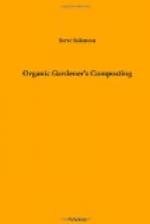Where you do hear of an organic farmer (not vegetable grower but cereal/livestock farmer) building extraordinary fertility by spreading large quantities of compost, remember that this farmer must be located near an inexpensive source of quality material. If all the farmers wanted to do the same there would not be enough to go around at an economic price unless, perhaps, the entire country became a “closed system” like China. We would have to compost every bit of human excrement and organic matter and there still wouldn’t be enough to meet the demand. Even if we became as efficient as China, keep in mind the degraded state of China’s upland soils and the rapid desertification going on in their semi-arid west. China is robbing Peter to pay Paul and may not have a truly sustainable agriculture either.
I’ve frequently encountered a view among devotees of the organic gardening movement that if a little organic matter is a good thing, then more must be better and even more better still. In Organic Gardening magazine and Rodale garden books we read eulogies to soils that are so high in humus and so laced with earthworms that one can easily shove their arm into the soft earth elbow deep but must yank it out fast before all the hairs have been chewed off by worms, where one must jump away after planting corn seeds lest the stalk poke you in the eye, where the pumpkins average over 100 pounds each, where a single trellised tomato vine covers the entire south side of a house and yields bushels. All due to compost.
I call believers of the organic faith capital “O” organic gardeners. These folks almost inevitably have a pickup truck used to gather in their neighborhood’s leaves and grass clippings on trash day and to haul home loads from local stables and chicken ranches. Their large yards are ringed with compost bins and their annual spreadings of compost are measured in multiples of inches. I was one once, myself.
There are two vital and slightly disrespectful questions that should be asked about this extreme of gardening practice. Is this much humus the only way to grow big, high-yielding organic vegetable gardens and two, are vegetables raised on soils super-high in humus maximally nutritious. If the answer to the first question is no, then a person might avoid a lot of work by raising the nutrient level of their soil in some other manner acceptable to the organic gardener. If the answer to the second question is less nutritious, then serious gardeners and homesteaders who are making home-grown produce into a significant portion of their annual caloric intake had better reconsider their health assumptions. A lot of organic gardeners cherish ideas similar to the character Woody Allen played in his movie, Sleeper.




